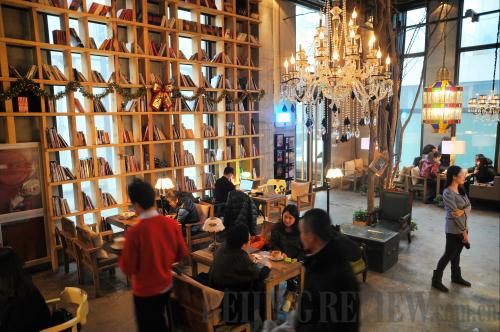|
 |
|
BUSINESS IS GOOD: Customers fill a Maan Coffee branch in central Beijing (WEI YAO) |
Tea time, or not?
Teahouses often cater to an older clientele, and there's no guarantee that the current café-going younger generation will file into teahouses in the future.
"The lack of strongly branded chains among the traditional teahouses means the sector has so far failed to meet the challenge posed by the rise of the café chains, while the few existing chains have focused on a very narrow, higher-end, generally older consumer segment," said Crabbe.
That older segment is an association that could be off-putting for China's à la mode.
"Teahouses and coffee shops represent tradition and a new trend," says 31-year-old Pei Jia who works in marketing for a multinational company and drinks coffee two or three times a week, but is also a daily tea drinker. "Obviously the younger generation doesn't want to be tagged with the older."
Peng Moxie, 25, who regularly visits cafés but makes his own coffee at home every morning, said he doesn't visit teahouses "because they feel too serious to me. I feel like the atmosphere is more formal than at a café."
For Xu, the English instructor, the reception she receives at a coffee shop is what keeps her coming back.
"I think the service in coffee shops is better than in teahouses … Generally speaking, coffee shops are Western culture influencing Chinese culture. The waitresses are trained well and the atmosphere is warm. The service at teahouses—with the exception of some—is not good."
While coffee shop food and drinks don't come cheap, they pale in comparison to the offerings at some teahouses with hourly room rates and minimum consumption requirements. Teas too can be remarkably expensive, even for China's ready-to-spend urban middle class. At Baxiange, the priciest green tea is 108 yuan ($17) a cup. Black tea, 280 yuan ($45) per cup.
With a slow growth rate and uncertain business model, could teahouses become a thing of the past, replaced by the country's burgeoning café scene?
"I don't think cafés are a threat," says Song Maimai, 31, a landscape designer in Beijing and regular coffee drinker. "More or less, they're good for teahouses to think about how to develop their businesses."
A shopkeeper at Wuyutai, a chain shop selling a range of low to high-end packaged teas, says, "Chinese have been drinking tea for a lifetime—and they will continue to do so."
For Peng, whoever comes out victorious in the tea-coffee wars is anyone's guess, but he's certain of one thing.
"Teahouses might be challenged by coffee shops, but the tea culture will always be there."
Email us at: yushujun@bjreview.com | 